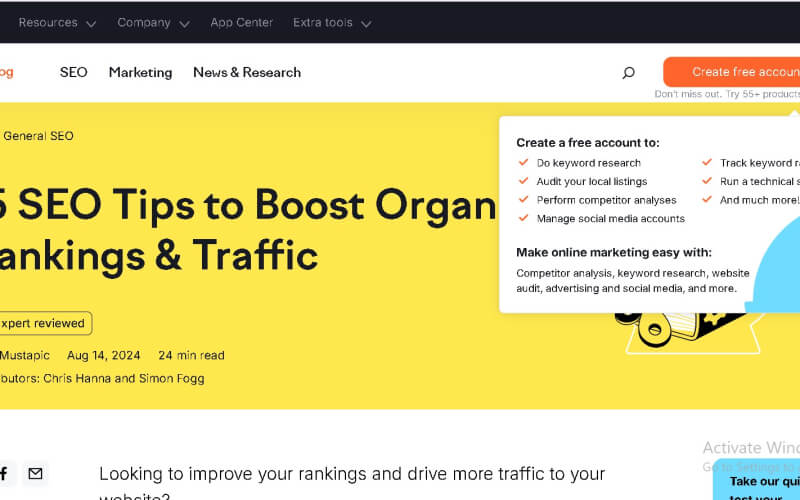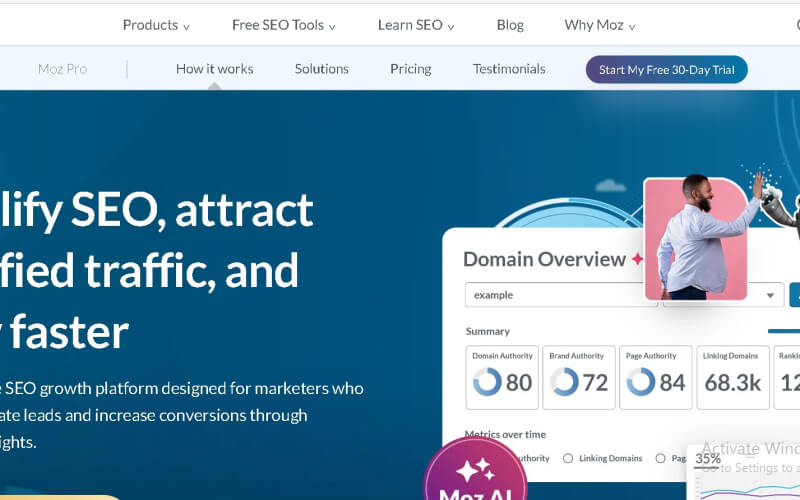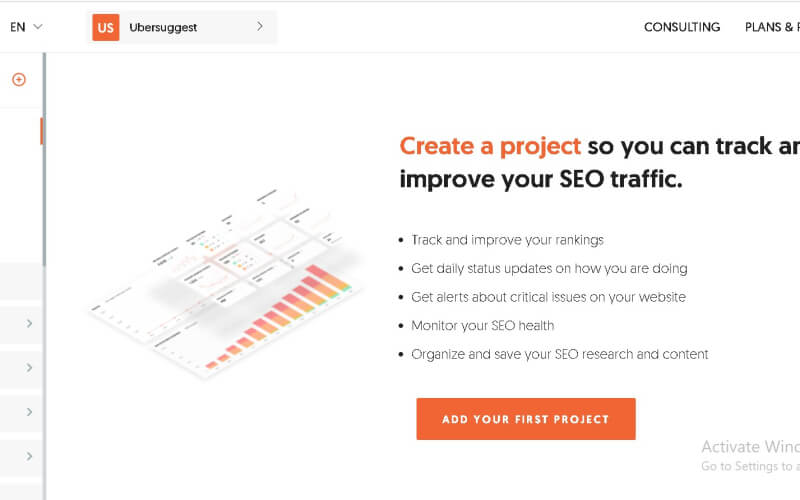SEO tools can help you get more people to visit your website. These tools make it easier to understand how search engines work and how to improve your site’s ranking. By using the right SEO tools, you can find out what people are searching for and make your website show up higher in search results.
The best SEO tools for beginners are easy to use and give you clear insights to boost your website traffic. You don’t need to be an expert to start using these tools. They can help you find good keywords, check how well your site is doing, and spot areas where you can make your website better. With these tools, you can start improving your website’s visibility and get more visitors.
1) Ahrefs
Ahrefs is a powerful SEO tool that can help you improve your website’s search rankings. It offers a wide range of features to boost your online presence.
With Ahrefs, you can find low-competition keywords to target. This helps you create content that’s more likely to rank well in search results.
You can also use Ahrefs to check your backlinks and analyze your competitors’ link profiles. This information is valuable for building a strong link strategy.
Ahrefs provides tools for site audits too. These help you identify and fix technical SEO issues on your website.
The rank tracking feature lets you monitor your progress in search engine results pages. You can see how your efforts are paying off over time.
While Ahrefs has many advanced features, it’s still user-friendly for beginners. The interface is clear and easy to navigate, making it a great choice for those new to SEO.
2) SEMrush

SEMrush is a powerful SEO tool for boosting organic rankings. It offers many features to help improve your website’s visibility in search results.
With SEMrush, you can research keywords and find new opportunities to target. The tool shows search volumes and competition levels for different terms.
You can also analyze your competitors’ strategies. SEMrush lets you see what keywords they rank for and what content performs well for them.
The site audit feature helps you find technical SEO issues on your website. It flags problems like broken links or missing meta descriptions.
SEMrush provides rank tracking to monitor your progress over time. You can see how your pages move up or down in search results for important keywords.
The tool also offers content optimization suggestions. It helps you create better content that targets the right keywords and meets user needs.
3) Moz Pro

Moz Pro is a comprehensive SEO toolkit that helps you improve your website’s search engine rankings. It offers a range of features to boost your online presence and drive more traffic to your site.
With Moz Pro, you can track your keyword rankings and see how your website performs compared to competitors. This tool also provides detailed site audits to identify and fix technical SEO issues.
One of Moz Pro’s standout features is its keyword research capabilities. You can find valuable keywords to target and analyze their difficulty and search volume. This helps you create content that attracts more visitors.
Moz Pro also includes a link research tool to help you build high-quality backlinks. You can analyze your current link profile and find new link-building opportunities.
For beginners, Moz Pro offers helpful insights that simplify complex SEO data. This makes it easier to understand what actions you need to take to improve your website’s performance.
4) Google Analytics
Google Analytics is a free tool that helps you track your website’s traffic. It shows you where visitors come from and what they do on your site.
You can see which pages get the most views and how long people stay. This info helps you find popular content and spot areas to improve.
Google Analytics can boost your SEO efforts by revealing keyword gaps and high-converting pages. You’ll learn which search terms bring visitors to your site.
Setting up Google Analytics is easy. Just add a small code to your website. Then you can start seeing data right away.
Use this tool to make smart choices about your content and layout. It helps you understand what your visitors want and how to keep them coming back.
5) Ubersuggest

Ubersuggest is a free SEO tool that can help you boost your website traffic. It offers many useful features for beginners.
You can use Ubersuggest to do keyword research and find new ideas for your content. The tool shows you search volume and difficulty scores for keywords.
Ubersuggest also lets you analyze your competitors’ websites. You can see what keywords they rank for and get ideas to improve your own strategy.
The site audit feature helps you find and fix SEO issues on your website. This can improve your search engine rankings.
You’ll also find content ideas and backlink data in Ubersuggest. These features can help you create better content and build more links to your site.
While some advanced features require payment, the free version offers plenty of value for beginners looking to improve their SEO.
Understanding SEO Basics
SEO helps your website appear higher in search results. This leads to more visitors and potential customers finding your site. Search engines use complex systems to decide which pages to show for each search.
Importance of SEO for Website Traffic
SEO brings free, passive, and consistent traffic to your website. When you rank high in search results, people are more likely to click on your site. This means more visitors without paying for ads.
Good SEO can: • Boost your brand visibility • Build trust with potential customers • Provide a better user experience
By optimizing your site, you help search engines understand your content better. This makes it easier for people to find you when they search for topics related to your business.
How Search Engines Rank Websites
Search engines use programs called crawlers to explore the web. These crawlers look at your site’s content, structure, and links to figure out what your pages are about.
Key factors in ranking include: • Relevant, high-quality content • Proper use of keywords • Fast loading speed • Mobile-friendly design • Backlinks from reputable sites
Search engines aim to show the most helpful and relevant results for each query. By focusing on these factors, you can improve your chances of ranking higher in search results.
Key Features to Look for in SEO Tools
Good SEO tools have features that make your job easier and more effective. They help you understand your website’s performance and find ways to improve it.
User-Friendly Interfaces
Look for SEO tools with simple, easy-to-use interfaces. You don’t want to waste time figuring out how to use the tool.
A clean dashboard that shows important info at a glance is helpful. This lets you quickly see how your site is doing.
The best tools have clear menus and options. You should be able to find what you need without getting lost.
Look for tools that offer tutorials or guides. These can help you learn how to use all the features.
Comprehensive Analytics and Reporting
Pick tools that give you detailed data about your website. This info helps you make smart choices to improve your SEO.
Look for tools that track your rankings for different keywords. This shows you how well your pages are doing in search results.
Good SEO tools also measure your site’s traffic. They should tell you how many people visit your site and which pages they look at.
Choose tools that create easy-to-read reports. These reports should show your progress over time and highlight areas that need work.
Keyword Research Capabilities
Keyword research is a key part of SEO. Your tool should help you find good keywords to target.
Look for tools that show you how many people search for each keyword. This helps you pick keywords that will bring more traffic to your site.
The tool should also tell you how hard it is to rank for each keyword. This helps you choose keywords you can realistically compete for.
Some tools suggest related keywords. This can give you new ideas for content that might attract more visitors to your site.
Common Mistakes Beginners Should Avoid
New SEO users often make errors that can hurt their website’s performance. Being aware of these pitfalls can help you avoid them and improve your site’s visibility.
Overusing Keywords
Stuffing too many keywords into your content can backfire. Google may see this as spam and penalize your site.
Focus on using keywords naturally. Include them in:
- Page titles
- Headings
- First paragraph
- Image alt text
Don’t force keywords where they don’t fit. Aim for 1-2% keyword density in your content.
Write for humans first, search engines second. Quality content that readers find useful will perform better in the long run.
Ignoring Mobile Optimization
With most web traffic now coming from mobile devices, not having a mobile-friendly site is a big mistake. Google uses mobile-first indexing, meaning it looks at your mobile site first.
To optimize for mobile:
- Use responsive design
- Ensure fast loading times
- Make buttons and links easy to tap
- Use readable fonts and font sizes
Test your site on different devices and screen sizes. Fix any issues that make it hard to use on mobile.
Neglecting Metadata
Metadata helps search engines understand your content. Forgetting to optimize it can hurt your rankings.
Key metadata elements to focus on:
- Title tags: Include your main keyword and keep it under 60 characters.
- Meta descriptions: Write compelling summaries of your content in 150-160 characters.
- Header tags (H1, H2, etc.): Use these to structure your content and include relevant keywords.
Don’t copy metadata across pages. Make each page’s metadata unique and relevant to its content.
Frequently Asked Questions
SEO can seem complex, but there are proven strategies and tools to help beginners boost their website traffic. Let’s explore some common questions about getting started with SEO.
What are some effective SEO strategies for increasing website traffic for beginners?
Focus on creating high-quality content that answers your audience’s questions. Use relevant keywords naturally in your text, headings, and meta descriptions. Build backlinks by reaching out to other websites in your niche. Make sure your site loads quickly and works well on mobile devices.
How do Google Analytics assist in improving SEO for new websites?
Google Analytics helps you track visitor behavior on your site. You can see which pages get the most traffic and how long people stay. This data helps you identify popular content and areas for improvement. You can also track where your visitors come from and which keywords they use to find you.
What features should one look for in a website builder to ensure the best SEO capabilities?
Look for a builder that allows custom meta titles and descriptions. It should let you edit URLs and add alt text to images. Good builders offer responsive designs for mobile optimization. They should also provide easy integration with Google Analytics and XML sitemap generation.
Are there any SEO tools that are particularly useful for those new to SEO?
Yes, several tools are great for beginners. SEMrush offers keyword research and competitor analysis. Moz Pro provides site audits and rank tracking. Ubersuggest is user-friendly for keyword ideas. Ahrefs helps with backlink analysis and content research.
What free SEO tools are available for beginners wanting to enhance their website traffic?
Google Search Console is an essential free tool for monitoring your site’s performance in search results. Google Analytics tracks visitor data. Answer the Public helps with content ideas based on popular searches. Yoast SEO plugin for WordPress assists with on-page optimization.
How does one go about learning SEO fundamentals for website optimization?
Start by reading reputable SEO blogs and guides from sites like Moz and Search Engine Journal. Watch video tutorials on YouTube from experts like Neil Patel. Practice using free SEO tools on your own website. Join SEO forums and communities to ask questions and learn from others’ experiences.
This article is for informational purposes only and not financial advice. Please do your own research or consult a professional before making financial decisions. The writer and publisher bear no responsibility for any potential losses or damages. Any reliance you place on information from onlinemoneytrendz.com is strictly at your own risk. Please read our Terms of Service for more information






Pingback: Top Freelancing Platforms for Beginners: Where to Start
Pingback: Selling Digital Products: The Ultimate Guide to Creating and Profiting
Pingback: SEO for Income A Step-by-Step Guide for Freelancers - Online Money Trendz